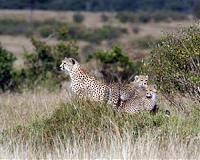| . |  |
. |
Somerville MA (SPX) Jun 02, 2010 For marine iguanas living in the Galapagos Islands, an El Nino can be deadly. Some die from starvation while others survive. Scientists have long believed that the difference between life and death for the iguana depended on the animals' ability to secrete the stress hormone corticosterone. Under stressful conditions, corticosterone functions like a spigot by controlling how the body expends energy during an emergency. It is associated with the "fight or flight" response to stress and is similar to cortisol in humans. But corticosterone can also be lethal if the spigot is not turned off, according to a study of marine iguanas published in the May 26 online issue of the Proceedings of the Royal Society. The findings could provide insight into how wildlife in the Gulf of Mexico will respond to the current oil spill. Animals will secrete corticosterone to help them cope with the disaster. However, prolonged hormone production could factor into how well animals are able to survive the crisis. From 2002 through 2008, a research team led by Tufts University Professor of Biology L. Michael Romero studied corticosterone levels in iguanas on Santa Fe Island before and after the El Nino that struck in late 2002. The team, funded by the National Science Foundation, included co-author Martin Wikelski from the Max Planck Institute for Ornithology and Konstanz University. The Galapagos Islands' marine iguanas are a suitable model for study because they live in predictable natural conditions. The animals feed exclusively on marine algae. Their greatest and almost only threat or stress occurs during recurrent El Nino-induced food shortages, when a decrease of algae can lead to starvation. The scientists captured 98 healthy male iguanas on the island in December 2002, just weeks before the El Nino. They injected a group of the animals with a hormone to stimulate a biological process called negative feedback which lowers the natural corticosterone levels in the animals' blood. The animals responded in one of two ways. Some reacted by shutting shut down the release of corticosterone. In other iguanas, the secretion of corticosterone continued, producing excessive concentrations of the hormone in the blood. Romero and Wikelski returned to Santa Fe Island in July 2003. Twenty-three of the animals had starved to death, but seventy-five had survived. According to Romero, the dead iguanas were imperiled by their inability to turn off their stress response. This produced elevated corticosterone levels. In this condition, the animals had depleted the protein reserves that could be processed into energy during a stressful event. In their weakened condition, these iguanas were more susceptible to starvation than their counterparts. Romero points to several major implications of the findings. First, negative feedback is a vital component of a successful stress response. "The results from the iguanas indicate that the better an individual is at coping with stress - by turning off the response as soon as possible - the better the chance they have to survive," he says. The ultimate goal of the research, says Romero, is "to understand what causes stress in wild animals; what physiological mechanisms are turned on in response to stress and how those mechanisms help the animals survive in their natural habitats." This work has immediate implications for the current oil spill in the Gulf of Mexico. "As animals encounter the spill, they will have a robust release of corticosterone to help them cope with the consequences of the oil," says Romero. "However, those animals that can best turn off their corticosterone response once the initial danger from the oil has passed will probably be the most likely to survive," he says.
Share This Article With Planet Earth
Related Links Tufts University Darwin Today At TerraDaily.com
 The Star Of Africa's Savanna Ecosystems May Be The Lowly Termite
The Star Of Africa's Savanna Ecosystems May Be The Lowly TermiteCambridge, MA (SPX) Jun 01, 2010 The majestic animals most closely associated with the African savanna, fierce lions, massive elephants, towering giraffes may be relatively minor players when it comes to shaping the ecosystem. The real king of the savanna appears to be the termite, say ecologists who've found that these humble creatures contribute mightily to grassland productivity in central Kenya via a network of unifor ... read more |
|
| The content herein, unless otherwise known to be public domain, are Copyright 1995-2010 - SpaceDaily. AFP and UPI Wire Stories are copyright Agence France-Presse and United Press International. ESA Portal Reports are copyright European Space Agency. All NASA sourced material is public domain. Additional copyrights may apply in whole or part to other bona fide parties. Advertising does not imply endorsement,agreement or approval of any opinions, statements or information provided by SpaceDaily on any Web page published or hosted by SpaceDaily. Privacy Statement |